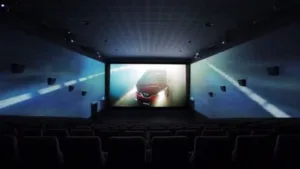In the recent article ‘Cinematically Immersive Environments’ published by Michael Goldman, in SMPTE Newswatch, November 2015 #2, he discusses the opportunities that augmented reality may bring to the cinema environment. The article quotes Peter Ludé, CEO of Real D and former SMPTE President as he recalls several events in expanding the capabilities of cinema projection to create a more immersive environment. This includes early adoptions of 3D and other cinema formats.

In today’s world people have been experimenting with wide screen formats similar to Cinerama to improve the immersion into the content in the theater. These solutions follow in the footsteps of IMAX and are using multiple projector systems that project images for the peripheral vision of the viewer. Screen X by the Korean CJ Group is mentioned as one of these solutions. (Barco Escape is another – Barco Focuses its Efforts – Man. Ed.)
Source: ScreenX
The article also discusses more recent solutions where augmented and virtual reality solutions augment the theatrical content presentation. One idea is to hand out AR glasses to the viewer who will then see additional information like additional characters, ghosts, subtitles and the like.
Then there is the virtual reality solution that has been basis for some experiments. As is pointed out, Oculus Rift was used in the Oculus Cinema application where users go to the cinema to watch a movie on the virtual reality headset. In addition there was an experiment with virtual reality at the Reese Witherspoon movie ‘Wild’, where Fox Searchlights and partners created a short immersive experience based on the movie’s character to deepen the cinematic story.
This is not even close to the other solutions of creating a more immersive environment for the viewers by adding more screens to create a wider field of view for a larger audience. VR creates this in 360 degree style for every single user.
Reading this article gives one the feeling that the movie industry is becoming increasingly nervous about the availability of AR and VR solutions. It seems this anxiety is somewhat related to the question of whether consumers will eventually chose a VR solution over going to the movie theaters? A great question indeed.
Looking at the movie industry today, we can see that, measured just by movie attendance, most movies are already failures in a commercial sense. Production and marketing cost far outpace ticket sales. Especially since ticket sales are still have to be split between the movie theater owners and the studios. Well, here comes DVD and BluRay to the rescue. What you can’t make up in ticket sales has to come from other content sales and rentals. Yes, Netflix, Hulu and others as well as merchandising sales are contributing to the bottom line that determines the ultimate success of the movie. Why would this be different for the use of content on a virtual headset? So is this fear just hype or is it real?
When we look at the movie theater owners, this is a real threat and something that will eventually change the landscape of how we consume entertainment content. In my eyes this is not a question of if, but when. Consequently the display industry will face a substantial change in product demand. Large cinema projectors may see a downturn, while small high resolution displays for VR headsets will see an increase in usage. This is a trend the display industry has been seeing in other applications for quite some time already.
I am aware that many readers will be saying there is no comparison between a movie watched in the cinema and the same content shown on a VR headset. I would generally agree with this statement, but I believe that ultimately the VR headset will win. I don’t think that this will happen any time soon, but when we look at the use of the smartphones and tablets over PCs and TVs, mobility and the freedom to watch content at a time the consumer wants, VR will be winning. I am not going to make any suggestion when this will happen, but I am convinced that it will. The use model is just too appealing for the smartphone generation.
When we look at the content creation side, I do not see any reason to fear VR at all. Sure it may require new concepts to capture 360 degree imagery in the context of a story, but as it destroys the boundaries of the cinematic story in the current form, it also opens a really wide field for new and hopefully exciting opportunities to bring a story to the consumer. Not all ideas will work, especially in the beginning with VR hardware still in an early stage and consumers totally unaware of what to expect.
All in all, I believe that AR and VR will play a similar role in the use of consumer content consumption as smartphones and tablets have in the last five to ten years, a complete new way of bringing content and information to the consumer. I just don’t believe that we will see this developing any time soon. I guess it is a ‘glass half full’ versus ‘glass half empty’ kind of situation, it is entirely up to you if you see AR / VR technology as an opportunity or a threat. Norbert Hildebrand

